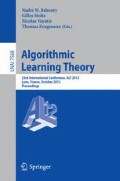Abstract
In this work, we lower bound the individual sequence anytime regret of a large family of online algorithms. This bound depends on the quadratic variation of the sequence, Q T , and the learning rate. Nevertheless, we show that any learning rate that guarantees a regret upper bound of \(O(\sqrt{Q_T})\) necessarily implies an \(\Omega(\sqrt{Q_T})\) anytime regret on any sequence with quadratic variation Q T .
The algorithms we consider are linear forecasters whose weight vector at time t + 1 is the gradient of a concave potential function of cumulative losses at time t. We show that these algorithms include all linear Regularized Follow the Leader algorithms. We prove our result for the case of potentials with negative definite Hessians, and potentials for the best expert setting satisfying some natural regularity conditions. In the best expert setting, we give our result in terms of the translation-invariant relative quadratic variation. We apply our lower bounds to Randomized Weighted Majority and to linear cost Online Gradient Descent.
We show that bounds on anytime regret imply a lower bound on the price of “at the money” call options in an arbitrage-free market. Given a lower bound Q on the quadratic variation of a stock price, we give an \(\Omega(\sqrt{Q})\) lower bound on the option price, for Q < 0.5. This lower bound has the same asymptotic behavior as the Black-Scholes pricing and improves a previous Ω(Q) result given in [4].
This research was supported in part by the Google Inter-university center for Electronic Markets and Auctions, by a grant from the Israel Science Foundation, by a grant from United States-Israel Binational Science Foundation (BSF), by a grant from the Israeli Ministry of Science (MoS), and by The Israeli Centers of Research Excellence (I-CORE) program, (Center No. 4/11). This work is part of Ph.D. thesis research carried out by the first author at Tel Aviv University.
Access this chapter
Tax calculation will be finalised at checkout
Purchases are for personal use only
Preview
Unable to display preview. Download preview PDF.
References
Boyd, S., Vandenberghe, L.: Convex Optimization. Cambridge University Press (2004)
Cesa-Bianchi, N., Lugosi, G.: Prediction, Learning, and Games. Cambridge University Press (2006)
Cesa-Bianchi, N., Mansour, Y., Stoltz, G.: Improved second-order bounds for prediction with expert advice. Machine Learning 66(2-3), 321–352 (2007)
DeMarzo, P., Kremer, I., Mansour, Y.: Online trading algorithms and robust option pricing. In: Proceedings of the Thirty-Eighth Annual ACM Symposium on Theory of Computing, pp. 477–486 (2006)
Even-Dar, E., Kearns, M., Mansour, Y., Wortman, J.: Regret to the best vs. regret to the average. Machine Learning 72(1-2), 21–37 (2008)
Gofer, E., Mansour, Y.: Lower bounds on individual sequence regret, http://www.cs.tau.ac.il/~eyalgofe/papers/indivseq_full.pdf
Gofer, E., Mansour, Y.: Pricing Exotic Derivatives Using Regret Minimization. In: Persiano, G. (ed.) SAGT 2011. LNCS, vol. 6982, pp. 266–277. Springer, Heidelberg (2011)
Hazan, E.: Efficient algorithms for online convex optimization and their applications. Ph.D. thesis, Princeton University (2006)
Hazan, E.: The convex optimization approach to regret minimization. In: Sra, S., Nowozin, S., Wright, S.J. (eds.) Optimization for Machine Learning. MIT Press (2011)
Hazan, E., Kale, S.: Extracting certainty from uncertainty: regret bounded by variation in costs. Machine Learning 80(2-3), 165–188 (2010)
Kalai, A., Vempala, S.: Efficient algorithms for online decision problems. J. Comput. Syst. Sci. 71(3), 291–307 (2005); Special issue Learning Theory 2003
Nesterov, Y.: Introductory Lectures on Convex Optimization: A Basic Course. Kluwer Academic Publishers (2004)
Rockafellar, R.T.: Convex Analysis. Princeton University Press (1970)
Zinkevich, M.: Online convex programming and generalized infinitesimal gradient ascent. In: ICML, pp. 928–936 (2003)
Author information
Authors and Affiliations
Editor information
Editors and Affiliations
Rights and permissions
Copyright information
© 2012 Springer-Verlag Berlin Heidelberg
About this paper
Cite this paper
Gofer, E., Mansour, Y. (2012). Lower Bounds on Individual Sequence Regret. In: Bshouty, N.H., Stoltz, G., Vayatis, N., Zeugmann, T. (eds) Algorithmic Learning Theory. ALT 2012. Lecture Notes in Computer Science(), vol 7568. Springer, Berlin, Heidelberg. https://doi.org/10.1007/978-3-642-34106-9_23
Download citation
DOI: https://doi.org/10.1007/978-3-642-34106-9_23
Publisher Name: Springer, Berlin, Heidelberg
Print ISBN: 978-3-642-34105-2
Online ISBN: 978-3-642-34106-9
eBook Packages: Computer ScienceComputer Science (R0)

